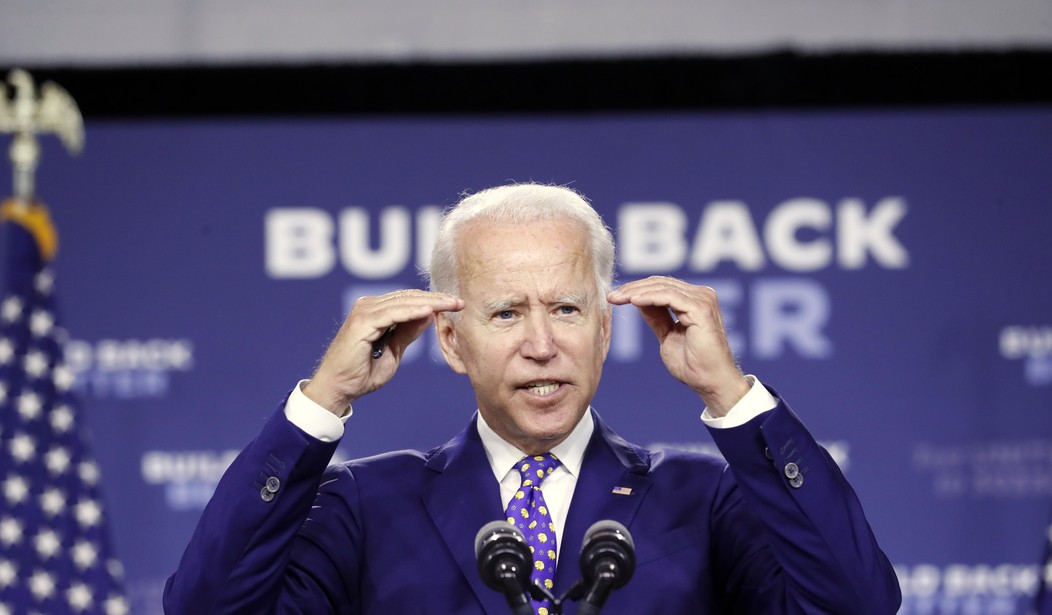If the presidential nominating process is the weakest part of our political system -- and, perhaps not coincidentally, one not referenced by the founders -- the vice presidential selection process comes solidly in second place. Some might even argue it's a contender for the top spot.
That's been particularly the case in the two most recent election cycles. The 2016 election, with Republican and Democratic nominees ages 70 and 69 on Election Day, respectively, elevated the actuarial odds of a vice president succeeding to the presidency to the highest level in history.
This year, the Republican and Democratic nominees turn 74 and 78, and the actuarial odds are accordingly grimmer. With Vice President Mike Pence sure to be re-nominated, the focus is on Joe Biden's choice, delayed now from the promised "first week of August."
Foreigners must consider it odd that 30 to 34 million people participate in selecting presidential nominees, but it's taken for granted that vice presidential nominees are selected by just one person. They may also consider it odd that Biden has limited his choice to women and, apparently -- he's not quite transparent on this -- to women who are nowadays called women of color. That limits the plausible picks to a very small percentage, and each of those mentioned seem to have at least one plausible disqualifying characteristic.
Former national security adviser Susan Rice, for example, with more foreign policy and national security experience than the others mentioned, was the Obama administration's designated liar, going on five Sunday programs as U.N. ambassador in 2012 to spread a legend about Benghazi. Sen. Kamala Harris is regarded by many Democrats as having been too prosecutorial when she was district attorney in San Francisco. Rep. Karen Bass was a big fan of Fidel Castro (Florida has 29 electoral votes). Rep. Val Demings was a cop.
Recommended
Looking back, the two women previously nominated for vice president, former Rep. Geraldine Ferraro and former Gov. Sarah Palin, also had thin credentials and glaring weaknesses. But both, in my view, performed better in their fall campaigns than the men who selected them were entitled to expect. Maybe Biden's choice will, too.
And there's historical precedent for nominees choosing from a sharply narrowed field. The Democratic Party has, from its beginnings, been a coalition of out-groups, capable of winning majorities when united.
Keeping them together, however, can be hard work. Narrowing the VP list to women, or black women, rewards two decadeslong core constituencies, feminist-minded female college graduates and blacks. The prospect of a black female vice president, especially one with a non-negligible actuarial chance of becoming president, might maximize turnout of college females and blacks.
Of course, Americans have already elected a black president and nearly elected a woman. The prospect of a black woman vice president might seem no big deal. After John F. Kennedy won the presidency with 78% of Catholic votes in 1960, Catholic VP nominees were chosen by Republicans in 1964 and by Democrats in 1968 and 1972. All three tickets lost.
Democrats have had to choose from narrow fields of VP possibilities before. In the six decades after the Civil War, when the party's major constituencies were white Southerners and Catholic immigrants, it was considered unthinkable to put a Southerner or a Catholic on the ticket.
During these years, Democrats -- and Republicans -- usually nominated Northern Protestants from New York, Ohio or Indiana, the three large marginal states in close elections. A VP nominee's local appeal, they hoped, might swing enough electoral votes to swing the election. We lack the polling evidence to indicate whether this was so.
But between 1868 and 1920, every winning ticket and most losing tickets had at least one nominee from these three states, which were the home bases of the winning VPs in 10 of 14 elections.
There's a stronger argument for ticket balancing, at least since former President Jimmy Carter and former Vice President Walter Mondale reinvented the vice presidency as a working part of the executive branch. All but one of the vice presidents selected then had a career path and a set of experiences significantly different from those of the president who selected them.
Former Vice Presidents Walter Mondale, Dan Quayle, Al Gore, Joe Biden and Mike Pence have 12 to 36 years of congressional experience, compared with zero to four years for the presidential nominees who picked them. George H. W. Bush and Dick Cheney had years of foreign policy and national security policy experience, while the nominees who picked them had virtually none.
Joe Biden, with tons of experience (36 years in the Senate, eight in the White House), is said to be wary of an ambitious VP and may be tempted to name someone with little or no experience. Balancing the ticket that way wouldn't be unprecedented but might be unnerving to voters with a sense of the actuarial odds.
Michael Barone is a senior political analyst for the Washington Examiner, resident fellow at the American Enterprise Institute and longtime co-author of The Almanac of American Politics.

























Join the conversation as a VIP Member